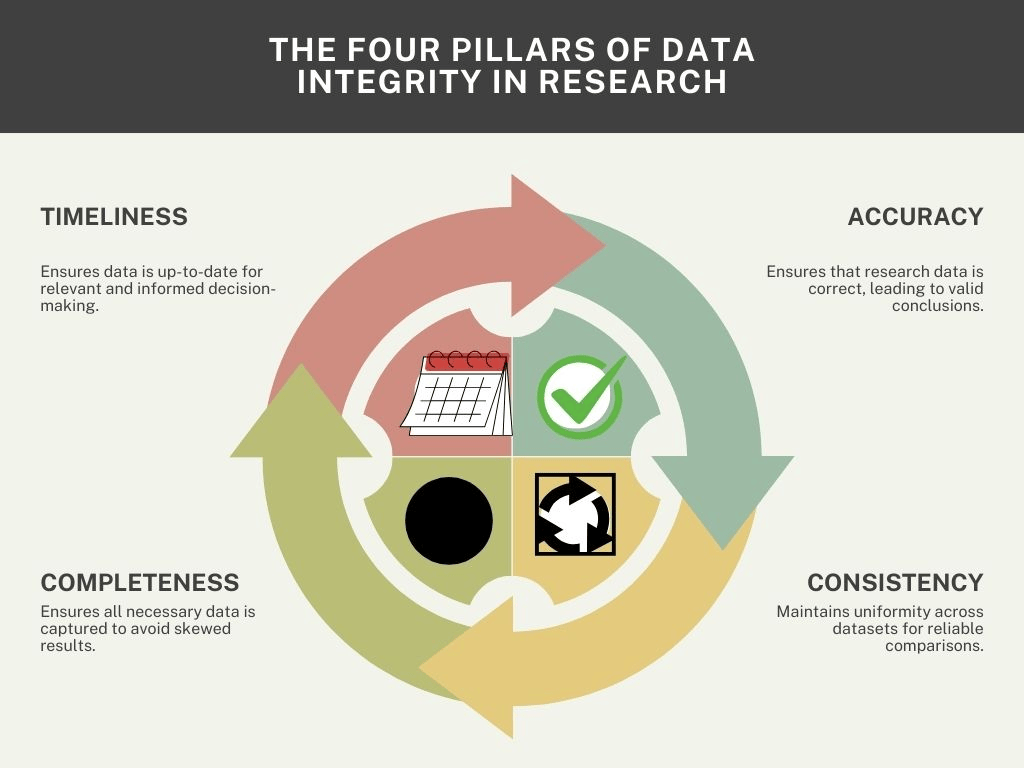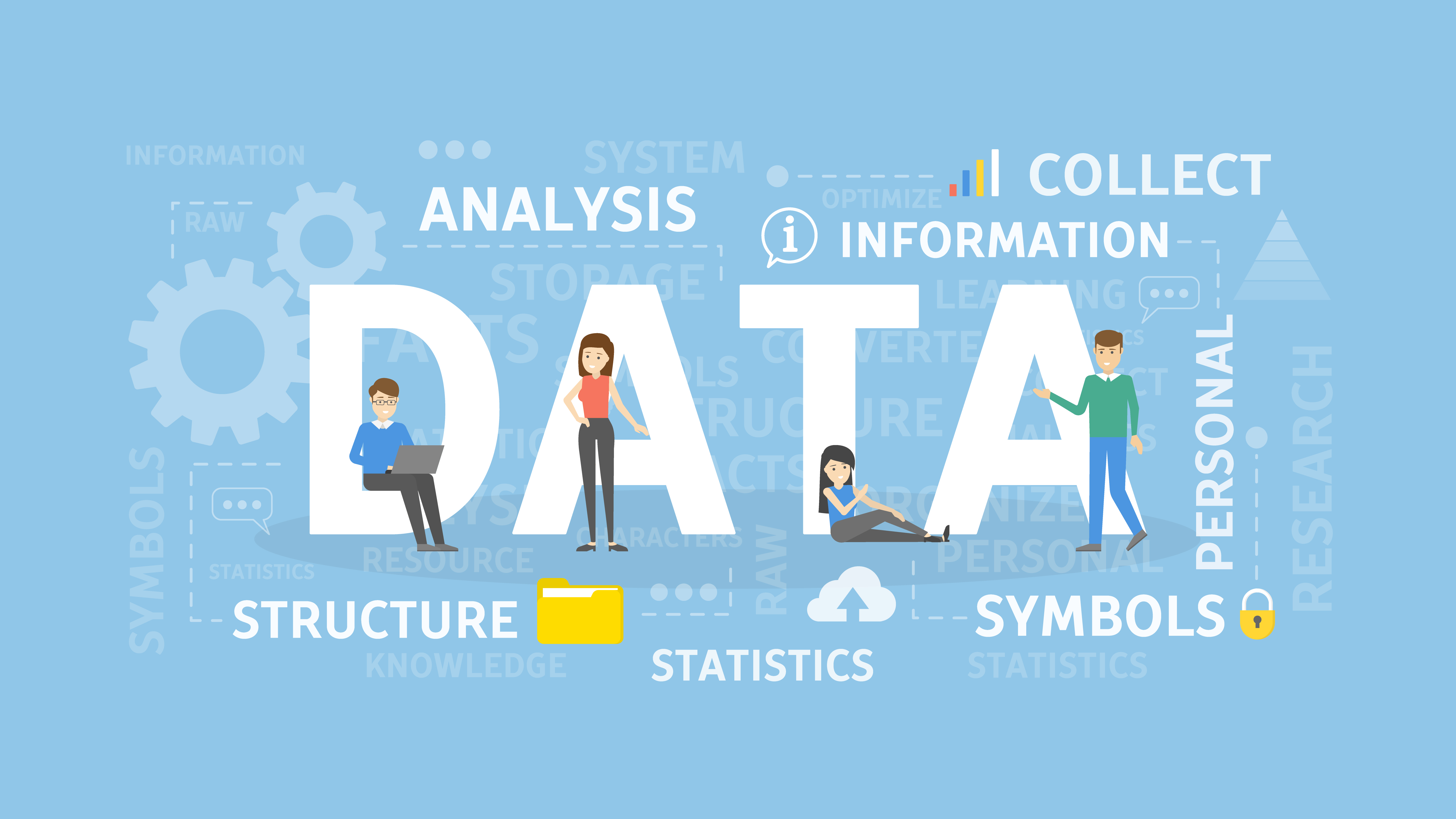Table of Contents
- Key Statistics on Data Integrity Challenges
- Understanding Data Integrity
- Data Integrity vs. Data Quality in Research
- The Role of Accurate Data Collection
- Data Integrity in Market Research
- Data Integrity in Academic Research
- Common Threats to Data Integrity
- Best Practices for Ensuring Data Integrity
- Data Cleaning: A Vital Step for Data Integrity
- Advanced Techniques for Data Integrity and Fraud Prevention
- FAQs About Data Integrity in Research
In today’s data-driven world, maintaining clean and trustworthy data is non-negotiable for professionals in market and academic research. This guide dives deep into the concept of data integrity in research—ensuring your data remains accurate, consistent, and reliable throughout its lifecycle. Whether you’re analyzing consumer behavior or conducting scientific studies, mastering research data integrity is essential for producing valid and dependable results.
Key Statistics on Data Integrity Challenges
- A 2023 study in the Journal of Research Ethics revealed that 68% of researchers faced data integrity issues, with survey fraud being a leading concern.
- The 2024 Global Research Integrity Consortium report found that data integrity breaches have increased by 22% in the past year alone.
These statistics highlight the urgent need for researchers to adopt best practices for data integrity and implement robust fraud detection measures.
Understanding Data Integrity
Data integrity is the foundation of trustworthy research. It ensures that information remains accurate, consistent, and reliable from collection to analysis. Simply put, it’s about guaranteeing that your data is free from corruption or manipulation.
Key Aspects of Data Integrity
- Accuracy: Data correctly represents reality.
- Consistency: Data remains uniform across datasets.
- Completeness: No missing or incomplete data.
- Validity: Data meets required formats and standards.

Whether you’re in market research or academic research, data integrity in research is critical. In market research, it ensures survey responses are genuine and free from fraud. In academia, it makes your findings credible and trustworthy.
Data Integrity vs. Data Quality in Research
Data integrity and data quality are interconnected yet distinct concepts in research. While both are crucial for reliable results, they focus on different aspects of data management. Data integrity ensures accuracy and consistency throughout the data lifecycle, whereas data quality assesses how well data serves its purpose.
| Aspect | Data Integrity | Data Quality |
|---|---|---|
| Definition | Ensures accuracy and consistency throughout the data lifecycle. | Assesses how well data serves its intended purpose. |
| Focus | Maintaining data accuracy, consistency, and reliability. | Evaluating the usefulness, relevance, and completeness of data. |
| Importance | Critical for preventing data corruption and ensuring reliable results. | Vital for making informed decisions and achieving research goals. |
| Examples | Protecting data from unauthorized changes, ensuring data remains unaltered over time. | Ensuring data is relevant, timely, and fit for its intended use. |
| Methods | Implementing data validation, audit trails, and secure storage practices. | Using data cleaning, data enrichment, and regular quality assessments. |
| Key Concerns | Data breaches, unauthorized access, data corruption, and loss of data integrity over time. | Inaccurate, incomplete, outdated, or irrelevant data that fails to meet research needs. |
The Role of Accurate Data Collection

Getting your data right from the start is crucial for maintaining both data integrity and quality. Here’s how you can nail accurate data collection:
For Market Researchers:
- Use clear and unambiguous survey questions.
- Implement survey fraud detection tools to prevent manipulation.
- Apply data validation techniques at the entry point to catch errors early.
For Academic Researchers:
- Regularly calibrate instruments to ensure correct measurements.
- Follow standardized protocols for data recording.
- Use double-entry systems to minimize human error.
Case Study:
A leading market research firm, MarketPulse Inc., implemented advanced survey fraud detection algorithms in 2023, resulting in a 35% reduction in fraudulent responses and a 28% increase in client satisfaction due to more reliable data.
By prioritizing accuracy from the moment data is collected, researchers set the stage for maintaining both data integrity and quality throughout the research process.
Data Integrity in Market Research
In market research, where consumer insights drive critical business decisions, maintaining data integrity is essential.
Why Data Integrity Matters in Market Research:
- Informed Decision-Making: Reliable data is crucial for businesses to make sound strategic choices.
- Reputation Management: Market research firms depend on accurate findings to maintain trust and industry standing.
- Competitive Advantage: Firms providing reliable insights gain a significant edge in the market.
- Regulatory Compliance: Many industries require adherence to strict data regulations, making data integrity a legal necessity.
Challenges to Data Integrity in Market Research:
- Survey Fraud: Issues like bot responses, professional survey takers, and dishonest participants can compromise data.
- Data Manipulation: Pressure to alter data for client expectations must be resisted through ethical guidelines.
- Sample Representation: Ensuring unbiased samples is key to accurate insights.
- Consistency Across Methods: Maintaining data quality across various collection methods (online, phone, in-person) is challenging.
How to Maintain Data Integrity:
- Prevent survey fraud with advanced detection tools and CAPTCHA.
- Validate data through real-time checks and audits.
- Standardize data collection methods and train teams on best practices.
- Leverage AI for fraud detection and secure data storage.
Data Integrity in Academic Research
In academia, data integrity forms the bedrock of credible research and scientific progress. It ensures that findings are reliable, ethical, and reproducible, fostering trust in the scientific community.
Importance of Data Integrity in Academic Research:
- Reproducibility: Scientific studies must be replicable; compromised data integrity makes this impossible.
- Credibility: Researchers’ reputations depend on reliable data.
- Policy Influence: Academic research often guides public policy, making data accuracy critical for informed decisions.
- Funding: Integrity issues can jeopardize future research funding opportunities.
Challenges to Data Integrity in Academic Research:
- Publication pressure leading to rushed or compromised data practices.
- Managing large, complex datasets effectively.
- Maintaining consistency across collaborative research teams.
Best Practices for Ensuring Data Integrity in Academia:
- Standardize data collection and follow ethical guidelines.
- Use secure storage and conduct regular audits.
- Employ statistical techniques for cleaning and validation.
Common Threats to Data Integrity
Researchers face several challenges in maintaining data integrity, including:
- Human Error: Mistakes during data collection, entry, or analysis.
- Survey Fraud: Speeders, straight-liners, and professional respondents.
- Technological Failures: Data storage crashes, software glitches, or cyber-attacks.
Best Practices for Ensuring Data Integrity
- Robust Data Collection: Design clear questions, use validated measures, and add logic checks.
- Automated Survey Fraud Detection: Leverage AI to identify suspicious patterns and detect fraud.
- Secure Data Management: Encrypt data, limit access, and perform regular backups.
- Manual Reviews: Regularly audit responses for anomalies.
- Data Cleaning: Use statistical software to handle outliers and missing data.
Data Cleaning: A Vital Step for Data Integrity
Data cleaning ensures that your datasets are accurate, consistent, and free of errors. It is especially important in preventing survey fraud and maintaining overall data integrity.
FAQs

Q: What is the difference between data integrity and data quality?
A: Data integrity focuses on ensuring data remains accurate, consistent, and reliable, while data quality refers to how well data meets its intended purpose.
Q: How can I detect survey fraud in my research?
A: Use automated tools, analyze response times, and include attention checks to detect fraud.
Q: What are some common threats to data integrity in academic research?
A: Human error, publication pressure, technological failures, and managing large datasets.
Q: How often should I clean my research data?
A: Data cleaning should be ongoing, with initial cleaning after data collection and regular audits throughout the research process.
Q: Can blockchain technology help with data integrity?
A: Yes, blockchain provides an immutable record of data transactions, enhancing security and transparency.
Q: What are the consequences of poor data integrity in market research?
A: It can lead to faulty business decisions, client distrust, and wasted resources.
In an era where data drives decision-making across all sectors, maintaining data integrity in research has never been more critical. Whether in academic pursuits or market research endeavors, the reliability and accuracy of data form the foundation upon which knowledge is built and business strategies are crafted.
Prioritizing data integrity not only enhances your work’s reliability but also supports the overall trustworthiness of your field. Keep your data clean, accurate, and reliable to drive impactful results.
